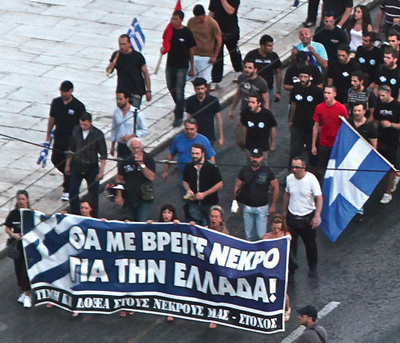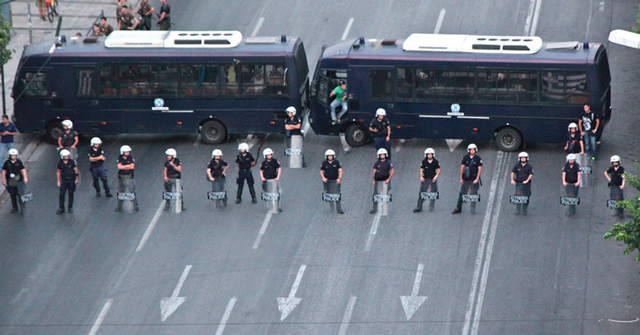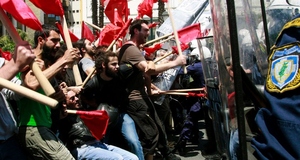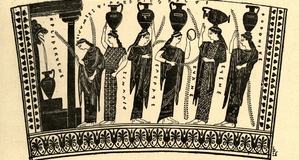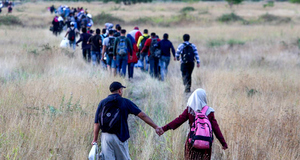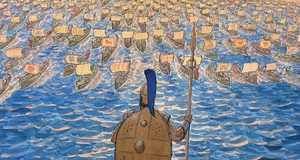From Cornell International Affairs Review VOL. 7 NO. 1From Fighting Nazis to Electing Nazis: The Rise of Golden Dawn in Greece
By
Cornell International Affairs Review 2013, Vol. 7 No. 1 | pg. 1/1
KEYWORDS:
In Greece's parliamentary elections of June 2012, a far-right neo-fascist party called Golden Dawn gained eighteen seats, making them the third most popular political party in parliament. An opinion poll published in October by KAPA Research Center reports that since then, their popularity has grown from 7.5 percent of the population to 10.4 percent1. Considering Greece's long and bloody relationship with fascism, the ascent of Golden Dawn into parliament has deeply puzzled many people, including Greeks. Golden Dawn's close resemblance to Nazism is particularly concerning.2 The party argues that only those with Greek blood are truly Greek, a statement that moves Golden Dawn beyond the nationalistic character of Italian fascism and closer to the biological racism of the National Socialist party of Nazi Germany. Citing Isokrates' Panegyricus, Golden Dawn seek to deprive foreigners from learning Greek, and further assume an obligation on the part of the Greek people to immerse themselves in Greek culture.3 They say his definition, that ‘people are called Greeks because they share in our education (paideusis) rather than in our birth',4 was meant to be exclusive rather than inclusive, stating intently in a recent blog post, "They are misinterpreting Isocrates to grant citizenship to migrants!".5 Anthropologist Michael Herzfeld warned in a recent talk that Golden Dawn is "much more than a Fascist party. It's not even a Neo-Nazi party. It's straight Nazi".6 One of Golden Dawn's regular chants is "Foreigners out!" and like the Nazis, Golden Dawn is more than willing to implement violence to realize this aim. Beating of foreign workers and vows to "rid the land of filth" have proliferated among Golden Dawn members;7 a Human Rights Watch report (2012) cautions that xenophobic violence has increased significantly since the rise of Golden Dawn. Notably, in January 2013, members of Golden Dawn repeatedly stabbed a Pakistani immigrant, leading to his death.8 While Golden Dawn's primary targets are illegal immigrants, the party ideology also incorporates the typical fascist scapegoats, such as Jews,9 Roma, LGBT persons, leftists, local minorities, nonChristians, and human rights defenders.10 Regarding Roma gypsies, who face tremendous marginalization in Greece, Golden Dawn MP Illias Koukoutsis is reported to have said, "We won't regard them as equal citizens until they stop their involvement in delinquency," adding that this was impossible since "gypsies are delinquent in their DNA".11 Golden Dawn's strategies have incorporated Nazi tactics, such as the infiltration of secondary schools12 and the targeting of immigrant ghettoes. Perhaps the most disconcerting information regarding Golden Dawn is that they have global aims. They have expanded their agenda to open party cells in Germany, Australia, Canada, and even America,13 although their propaganda has met a firm resistance in the U.S.14 Because of the remarkable similarity to the tactics and ideology of the Nazi party, Golden Dawn poses a serious challenge to Greece and the EU. Seeking to understand how Golden Dawn became popular in order to counteract its political strategy is an essential task. How could a country previously occupied by Nazi Germany (1941 to 1944), then ruled tyrannically by a military dictatorship (1967 to 1974) elect into parliament a neofascist party that openly praises Hitler? How could a country previously occupied by Nazi Germany, then ruled tyrannically by a military dictatorship, elect into parliament a neo-fascist party that openly praises Hitler? The simplistic explanation for a rise in extremism in Greece is the country's severe economic crisis, which intensified in 2010 and is ongoing today. Many Greeks, like others in times of extreme crises, have resorted to extremist solutions. However, a closer observation of Golden Dawn's strategic responses to the major issues plaguing Greece provides a more in-depth explanation for Golden Dawn's rise in political influence. The rise in attraction to Golden Dawn among Greeks can be specifically attributed to five factors. These include: Golden Dawn's conspicuous fulfillment of Greece's poorly run state services, their newly formed antiausterity political platform, the way in which Golden Dawn's immigration policy provides an all-inclusive cause/solution for Greece's problems, the ability Golden Dawn provides the Greek government to enact and expand its power, and perhaps the key factor, Golden Dawn's simultaneous public disavowal of ties to neo-Nazism and promotion of an ideology that appeals to Greece's relatively high level of ethnocentrism. Firstly, Golden Dawn has attracted supporters by conspicuously filling state roles that are traditionally plagued by ineffectiveness and corruption in Greece, such as unemployment services, healthcare, education and security. For example, while Greece's unemployment programs are overwhelmed by the country's 26.8% unemployment rate, Golden Dawn campaigned with a promise to cancel household debt for unemployed and low-wage earners15 and have since launched programs that support Greeks looking for work.16 Although certainly an empty claim, they addressed the rampant corruption in Greece by promising to arrest all corrupt politicians.17 Furthermore, Golden Dawn has exploited Greece's inadequate education system by launching politically motivated educational initiatives. These have been described as incorporating the "historical fascist model of infiltration" and are aimed at inculcating children with national pride and Golden Dawn's ideology.18 In one of these so-called "national awakening" sessions, Golden Dawn's official website posted a picture of well-dressed six to ten-year-old children who were taught about the Olympian gods, the ancient Greek pantheon and the Christian faith.19 Additionally, for Greece's first day of Lent,20 Golden Dawn organized a traditional kite-making event, albeit with kites sporting Golden Dawn's swastika-like symbol.21 When accused in parliament of using propaganda methods similar to those used in Nazi Germany, Golden Dawn MP Dimitris Koukoutsis responded angrily, "You're bothered by us teaching Greek history? We're going to write it too!".22 Uniformed Golden Dawn activists implement their idea of vigilante justice by knocking over immigrants' stands unless they can produce proper selling licenses The most striking example of Golden Dawn's exploitation of Greece's poorly run state services has been its infiltration of Greece's security apparatus. Anthropologists Antonis Vradis and Dimitris Dalakoglou and many news articles have reported that members in the police force conspicuously disregard or even cooperate with Golden Dawn when they attack immigrants.23 Indeed, support for Golden Dawn is significantly higher in the police force than among the general population;24 in some districts one in two police officers voted for Golden Dawn.25 Akin to Mussolini's blackshirts, Golden Dawn's para-state organizations police the streets in all black attire and offer escort services in immigrant-heavy areas.26 Uniformed Golden Dawn activists implement their idea of vigilante justice by knocking over immigrants' stands unless they can produce proper selling licenses.27 Unlike the state, Golden Dawn implements effective measures against illegal immigration and provides additional and personalized security services, which is attractive to Greeks concerned about increasing crime rates in Greece. Additionally, Golden Dawn has addressed Greece's unreliable healthcare system and nonexistent homeless services with regular blood drives and food drives, although Greek identification must be produced to receive any benefits.28 Basically, Golden Dawn implements a Nazi agenda with Hezbollah tactics.29 They offer social welfare where the state has clearly failed, which for some makes them more attractive than the neo-liberal platform, which maintains that welfare should decrease. Golden Dawn's political move of filling otherwise ineffective citizen services partially explains why some Greeks have accepted them as a politically viable option. The second response of Golden Dawn that helps explain its increase in popularity is its newly formed anti-austerity platform in direct opposition to the EU's harsh austerity packages imposed in 2012. Greek Socialists recognized this political move: "Golden Dawn clearly understood that allowing the left to monopolize the anti-austerity movement would give it a huge advantage in the battles for hearts and minds".30 The Greek party PASOK (Panhellenistic Socialist Movement), which developed in the 1970s out of the previous antidictatorship group, lost much of its credibility due to being in power when the economic crisis escalated. Further, PASOK is accused of adopting more centrist values in order to receive loans from the EU.31 Golden Dawn exploited the public resentment toward PASOK and established their party platform as opposed to any foreign sanctions, which aligns with Golden Dawn's nationalistic framework (i.e. "Greece for the Greeks!"),. This was a strategic move of the party, which proved attractive for many Greeks discontented with Europe's harsh austerity measures. Thirdly, Golden Dawn is attractive to some because their immigration policy describes a simplistic and easily understandable solution to Greece's problems. What is the source of Greece's problems? – The immigrants. What should Greece do? – Get them out. As Golden Dawn's MP Illias Panagiotaros put it, "There are no legal migrants in Greece, not even one".32 Similar to Hitler's explanation that the main cause of Germany's decline was the Jews,33 Golden Dawn's perspective is that foreign invasion has caused all of Greece's problems. Golden Dawn gained electoral support by campaigning in areas with high levels of immigrant problems asking the question, "Whose fault is it that there is such extreme poverty, unemployment, criminality, and no hope for the future?".34 Their propagandist answer is the immigrants, which becomes believable for those living in impoverished areas now abundant with loitering immigrants. Even for those not drawn to simplistic solutions, Golden Dawn provides an answer. They have addressed one of the country's major issues with a realizable plan, which although racist and harsh, is proactive and more coherent than the Left's idealistic plan of regularizing any and all immigrants. Immigration to Greece has increased at an unmanageable rate in the past decade due to factors that include increasing unrest in Eastern Europe, the Middle East and North Africa; ease of entry through the Greek islands; and poor border security. As a recently turned Golden Dawn supporter put it: "A lot of us vote for Golden Dawn. I did […] and I will probably […] again, because of what the problems are in Greece. Nobody is tackling these problems. Europe is not doing anything about it; the Greek government is trying its best, but not coming up with any real solutions to our problems. So yes, we are actually turning to Golden Dawn for help".35 Although Golden Dawn's suggestions are extreme – such as placing land mines along the border between Greece and Turkey – their policy is attractive because it is clear: we will prevent any further illegal immigration into Greece. The increasing level of immigration presents the country with a formidable challenge,36 and Golden Dawn has offered the first proactive solution, one that leads Greeks of all educational and economic backgrounds to vote for Golden Dawn's racist agenda. Fourthly, Golden Dawn is attractive to some in the Greek government itself because Golden Dawn's votes increase the government's capacity to suppress the bothersome Left and expand parliament's power. Golden Dawn's anti-immigration policies lure lawmakers because Golden Dawn supports proactive policies, which assist lawmakers in taking action and implementing their power. Anthropologist Dimitris Dalakoglou explains that Golden Dawn attracts some Greek politicians for dealing with Leftists, who are frequently making problems for the government with strikes and protests. Dalakoglou says to call Golden Dawn extremist is not entirely accurate because its party interests align in many respects with those of the increasingly authoritarian and reactionary government. Speakers at a conference at the University of Athens argued that there is a "systemic use" of Golden Dawn for the Greek government, which is to carry out their dirty work.37 With the growing distrust of the parties in office during the economic crisis, the government can regain its power by using Golden Dawn to attract votes from those who would not vote for the left. Indeed, the only reason New Democracy managed to form a ruling coalition in the last election was through appealing to the fear of a Golden Dawn takeover. New Democracy absorbed many members of LAOS, the Popular Orthodox Party, the most conservative party in Greece before Golden Dawn, through this tactic. Illustrating the party politics involved with Golden Dawn's rise, two of Greece's main newspapers recently produced articles on the same day arguing that Golden Dawn provides a solution to Greece's sharp political divide. The articles label the "two extremes" anarchism and radical Leftism but fail to mention that Golden Dawn itself is extreme.38 The increasing bias of Greek news venues is telling of the growing authoritarian government in Greece.39 Golden Dawn provides the nonliberals a chance to suppress the Left. The extra votes from Golden Dawn MPs give the Greek government the capacity to attack antiauthoritarian groups and to effectively address Greece's undesirable immigrant situation. For example, soon after Golden Dawn became a presence in parliament, the government launched a "fundamentally racist" and "pogrom-styled" police operation for dealing with migrants.40 Ironically called "Xenios Zeus" after the ancient Greek god of hospitality, the operation has overseen the arrests of 60,000 so-called "invaders"41 since its inception in August 2012. Despite a public statement from the European Committee for the Prevention of Torture (CPT) addressing Greece's inhumane detention centers for migrants,42 authorities in Greece continue to hold them in appalling conditions.43 Additionally, in January 2013, a transportation strike was suppressed using an emergency law only meant to be used in wartime.44 Further, as a result of coercive intimidation methods aimed at witnesses and attendees, the government acquitted Golden Dawn MPs in the trials brought against them for the use of violence. In one of his trials, MP Kasidiaris made the statement, "We are powerful and soon we'll be dominant".45 Golden Dawn's proactive policies are an attractive option for those looking to flex Greece's muscles and sidestep EU mandates for treatment of minorities.46 Golden Dawn has emphasized policies that symbolize the strength of the Greek state and downplayed their overtly violent and racist immigration agenda In piecing together how Golden Dawn got into parliament in the first place, it is important to distinguish between their symbolic actions in support of maintaining a Greek identity and their concrete actions taken against foreigners, which have been explicitly racist and violent. It is a fair assessment to say that most Greeks would appreciate the idea of national unity Golden Dawn supports, while being repulsed by their violent methods. Greeks are generally in favor of preserving the essence of "Greekness," but do not openly embrace Golden Dawn's systematic and violent campaign against immigrants. However, the question remains: how does Golden Dawn's popularity continue to grow? The fifth factor, the real genius of Golden Dawn, has been to disassociate themselves publicly from Neo-Nazism and the open use of violence, which would have been political suicide, and simultaneously to promote an ideology that appeals to Greece's relatively high level of ethnocentrism. Golden Dawn has emphasized policies that symbolize the strength of the Greek state and downplayed their overtly violent and racist immigration agenda, all the while pushing it forward. For instance, in response to a recent shooting of foreign workers requesting their wages, Golden Dawn publicly denounced the use of violence, then followed its statement with: "We also condemn those who illegally employ illegal immigrants, taking the bread away from thousands of Greek families" and "All illegal immigrants must be immediately deported".47 Golden Dawn denies that their symbol was taken from the Nazi swastika; rather, they say that their symbol is the ancient Greek meander, which pre-dates Nazism and was used by the Nazis to express their appreciation for ancient Greece. They also say the Nazi one arm salute, which the party has purportedly used several times,48 was originally an ancient Greek greeting.49 These explanations are satisfactory to many Greeks, who have been inculcated by the mainstream school curriculum's glorification of Greece's past.50 With these methods, Golden Dawn denies connections between the party and Nazism, although it was discovered in the recent raids on Golden Dawn MP's homes that their houses are littered with Nazi relics and propaganda.51 By implementing policies that appeal to Greece's ethnocentrism – such as educating children in Greece's rich history, maintaining Greece's independence by opposing austerity measures, opposing corruption in the government linked to foreign powers, improving and expanding social welfare programs, applying more stringent immigration policies, etc. – they have gained the wherewithal to push forward their xenophobic agenda. They have gained support by covering their blatant racism with a "Let's save Greece" guise. For instance, in April 2013, Golden Dawn members led by MP Koukoutsis entered hospitals under the pretense of goodwill missions, which in reality were forceful raids to check the papers of foreign nurses ("hospital raid"). New supporters of Golden Dawn are not all racist supporters of the use of violence; rather, some accept their claimed disassociation from Nazism and see Golden Dawn as the country's last hope. Greek lawmaker Stathis Boukouros explains, "If some kid decides to wear a Golden Dawn T-shirt and beat up a Pakistani, that's not our fault. We didn't order him to do it".52 The Greek nation is threatened, and some are willing to disregard the less than desirable actions associated with a political party if the party appears to be their only lifeline. These are the causes for Golden Dawn's rise in political influence in Greece. In short, Golden Dawn conspicuously fills inefficient state-run services; they ran on an anti-austerity platform during a time of unforgiving European intervention; they provide a simplistic and accessible answer for the cause and solution to Greece's complex problems; their votes provide increased power for Greek lawmakers; and they appeal to Greece's ethnocentric tendencies while strategically disassociating themselves from open acts of violence. For these reasons among others, Golden Dawn has gained popularity in Greece and continues to expand its influence. While the root of Golden Dawn's appeal is in their Greek-centered ideology, it is the specific tactics used to spread this ideology that facilitates their success. Golden Dawn's ideology certainly needs to be fundamentally combated, but this process takes time, something Greece does not have. The economic and social situation in Greece is dire and will worsen if Golden Dawn implements its racist agenda further. It is essential that the opposing parties to Golden Dawn respond directly to the tactics Golden Dawn has used to gain power. Alongside the overarching aim of working toward economic recovery, in order to defeat Golden Dawn, a party or coalition of parties in Greece should be aimed at the following: making Greece's state services more effective, directly addressing the issue of corruption in the government, seeking less stringent austerity measures for the Greek people and most importantly, developing a coherent, more humane plan for dealing with immigration. A party focused on these actions will demonstrate that its primary aim is to preserve the Greek people and thus will cut off Golden Dawn's political lifeline. Rather than simply denouncing Golden Dawn's actions, thus far their opposition's only strategy, they need to take action themselves. Without a swift response to Golden Dawn's political strategies Greece and the European Union face the grave threat that Golden Dawn's ultra-nationalist, neo-fascist ideology will continue to permeate Greeks' minds and hearts, and as we have seen, their votes. Editor's Note: In August 2013, after completion of this essay, a Golden Dawn member was charged with the fatal stabbing of prominent leftist rapper, Pavlos Fyssas. Fyssas's death prompted a crackdown on the party from the Greek government, which included the arrest of Golden Dawn founder and leader Nikolaos Michaloliakos on grounds of being the head of a criminal gang. 15 other Golden Dawn members, including 5 members of Parliament, were arrested, the party was excluded from state funding, and investigations sought to expose police collaboration with the party. That it took the public murder of a Greek celebrity to inspire the government into action illuminates the unsettling political landscape of the Greek state in crisis. ReferencesAlderman, Liz. “Greek Far Right Hangs a Target on Immigrants.” New York Times. 10 July 2012. Web. 25 Apr. 2013 Arkouli, Maria. “Roma-Golden Dawn Conflict at Kalamata Hospital.” Greek Reporter. 9 Apr. 2013. Web. 25 Apr. 2013. Baboulias, Yiannis. “’We are powerful and we will soon be dominant’: Golden Dawn’s intimidation in the courtroom.” NewStatesman. 12 March 2013. Web. 25 Apr. 2013. “Daily News – May 31.” Golden Dawn – International Newsroom. 1 June 2013. Web. 15 Nov 2013. Dalakoglou, Dimitris. “Greetings from Athenian democracy.” OpenSecurity. 14 Feb. 2013. Web. 24 Apr. 2013 Damian, Mac Con Uladh. “Fascists go to school.” Politics: A Citizens Guide to Greece. 13 March 2013. Web. 24 Apr. 2013. Farkash, Tali. “Diaspora Report 2013: Jews of Greece versus Neo-Nazis.” Ynetnews.com. 31 Mar. 2013. Web. 25 Apr. 2013. “Athens Indymedia, 98FM and Radio Entasi repressed by the Greek government: updates.” From the Greek Streets. 12 Apr. 2013. Web. 25 Apr. 2013. Gerodimos, Roman. “First thoughts on the 17 June 2012 election in Greece.” Greek Politics Specialist Group (GPSG). Web. 25 Apr. 2013. “Greece fast becoming ‘Fascist’ with the growing Right Wing Golden Dawn gaining on National Plank.” Unity Media News. 10 Mar. 2013 Web. 25 Apr. 2013. “Golden Dawn attempts another hospital raid.” EnetEnglish.gr. 9 Apr. 2013. Web. 25 Apr. 2013. “Golden Dawn take advantage of Greek tragedy.” Jewish News One. 26 Mar. 2013. Web. 25 Apr. 2013. Gopalakrishan, Manasi. “The new Nazis.” The Express Tribune with the International Herald Tribune. 10 Mar. 2013. Web. 25 Apr. 2013. “Greece’s Golden Dawn attack market vendors.” Euronews. 9 Sept. 2012. Web. 25 Apr. 2013. “Hate on the Streets.” Human Rights Watch. 10 July 2012. Web. 25 Apr. 2013. Hitler, Adolf. Mein Kampf. Boston: Houghton Mifflin Company, 1998. Print. Henely, Rebecca. “Officials want Neo-Nazis set out of Astoria.” TimesLedger. 11 Oct 2012. Web. 15 Nov 2013. Herzfeld, Michael. “Crisis and Continuity: Greece and the Refashioning of Culture.” Lecture. 21 Feb 2013. Web. 15 Nov 2013. Ioizidou, Amalia. “Greece: The menace of Golden Dawn.” Socialism Today. 30 Dec 2012. Web. 1 Apr. 2013. H., K.. “Golden Dawn’s ‘national awakening’ sessions.” The Economist. 4 Mar. 2013. Web. 1 Apr. 2013. Kakissis, Joanna. “Far-Right Greek Party Rides Wave of Economic Anger.” NPR. 13 November 2012. Web. 24 Apr. 2013. Lambropoulos, Vassilis G. “One to two officers voted ‘Golden Dawn” [in Greek]. TO BHMA. 5 Nov. 2012. Web. 25 Apr. 2013. Mason, Paul. “Alarm at Greek police ‘collusion; with far-right Golden Dawn.” BBC. 17 Oct. 2012. Web. 25 Apr. 2013. Mazower, Mark. “A New Age of Extremes? Historical Reflections on the Politics of the Present Crisis.” Webcast Talk. 12 Feb 2013. Web. 24 Apr. 2013. McDonough, Paul. “Putting solidarity to the test: assessing Europe’s response to the asylum crisis in Greece.” Research Paper No. 231. The UN Refugee Agency (UNHCR), Jan 2012. Web. 25 Apr. 2013. Mokhtar, Hatef. “Rise of Greece’s Golden Dawn: A presage of doom.” Jewish Journal. 14 March 2013. Web. 1 Apr. 2013. Muižnieks, Nils. “Report following his visit to Greece.” Commissioner for Human Rights, Strasborg. 16 Apr 2013. Web. 25 Apr. 2013. Paganou, Sherri Moshman. “Historian Mark Mazower says Greece Underestimates the Danger Posed by the Ascendancy of Golden Dawn.” The American College of Greece (ACG) Media & Press. Web. 25 Apr. 2013. Terry L. Papillon, The Oratory of Classical Greece: Isocrates II, 2004. Paphitis, Nicholas. “Greece Pledges Swift Punishment Over Farm Shooting.” AbcNews. 18 Apr. 2013. Web. 25 Apr. 2013. Placas, Aimee. E-mail Interview. 25 Apr. 2013. “Public statement concerning Greece.” Council of Europe. European Committee for the Prevention of Torture and Inhuman or Degrading Treatment or Punishment (CPT), Strasborg. 15 March 2011. Web. 25 Apr. 2013. Porter, James, Classical Pasts: The Classical Traditions of Greece and Rome, Princeton University Press, 2006 Sassard, Sophie. “Opinion poll shows Greek opposition pulling ahead.” Reuters. 10 Nov. 2012 Web. 25 Apr. 2013. Sitaropoulos, Nicholas. “Equal treatment between persons irrespective of racial or ethnic origin: the transposition in Greece of EU Directive 2000/43.” The International Journal of Human Rights 8.2 (2007): 123-158. Web. Smith, Helena. “Greece breaks up Athens metro strike.” The Guardian. 25 Jan 2013. Web. 25 Apr. 2013. Smith, Helena. “Greece’s neo-Nazi Golden Dawn goes global with political ambitions.” The Guardian. 1 Apr. 2013. Web. 25 Apr. 2013. Smith, Helena. “Greece to open few detention centres for illegal migrants.” The Guardian. 29 Mar. 2012. Web. 25 Apr. 2012. “Who, What, Why: Can you accidentally do a Nazi salute?” BBC. 18 March 2013. Web. 25 Apr. 2013. Vlachos, Georgios. “Ethnocentrism in Greek primary education according to the analytic teaching programme and a selection of school manuals.” Dissertation at University of Johannesburg, 2005. Web. Vradis, Antonis and Dalakoglou, Dimitris. Revolt and Crisis in Greece: between a present yet to pass and a future still to come. Oakland: AK Press, 2011. Print. Xenakis, Sappho. “A New Dawn? Change and Political Continuity in Greece.” Terrorism and Political Violence, 24 (2012): 437-464. Web. Xenakis, Sappho. “Violent extremism in Greece: Focusing on the far-right.” Extremis Project. 26 Mar. 2013. Web. 25 Apr. 2013. Image AttributionsBy Ggia (Own work) [CC-BY-SA-3.0 (http://creativecommons.org/licenses/by-sa/3.0)], via Wikimedia Commons By Steve Jurvetson (Flickr) [CC-BY-2.0 (http://creativecommons.org/licenses/by/2.0)], via Wikimedia Commons By Steve Jurvetson (Flickr: Bring the Pain) [CC-BY-2.0 (http://creativecommons.org/licenses/by/2.0)], via Wikimedia Commons Endnotes
Suggested Reading from Inquiries Journal
Inquiries Journal provides undergraduate and graduate students around the world a platform for the wide dissemination of academic work over a range of core disciplines. Representing the work of students from hundreds of institutions around the globe, Inquiries Journal's large database of academic articles is completely free. Learn more | Blog | Submit Latest in Political Science |


